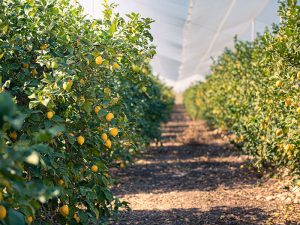Esther Arce participating in the banding of European Turtle Doves (Streptopelia turtur) for the AgriConCiencia project PHOTO: ANSE (C)
In a world in which agriculture is facing increasingly complex challenges, the role of women in this sector is becoming increasingly important.
Last International Rural of Rural Women ,our colleague Esther Arce, agricultural engineer, was interviewed by the ANSE Association, offering a unique perspective on her profession and talking about the importance of integrating sustainability, innovation and equity in rural areas.
Esther Arce’s journey in agriculture
Esther Arce shares with us in this interview with the ANSE Association how her passion for agriculture was sparked by her closeness to the rural world. From a young age, she observed the impact of land and crops on daily life, which later led her to choose agricultural engineering as her vocation.
Throughout her career, Esther has worked not only in the design and management of agricultural projects, but also in the promotion of sustainable practices that protect the environment and improve the quality of life of rural communities.
The role of rural women in the agricultural sector
Although women have traditionally played a crucial role in agricultural activities, their work has often gone unrecognised. Esther stresses how rural women are not only fundamental to cultivation and production, but also to innovation and sustainability in the sector.
“Sustainability starts from those who work directly with the land,” he says. According to her, rural women are not only contributing to the livelihoods of their families, but are also leading projects that integrate new technologies and environmentally responsible practices.
Challenges and opportunities for women in agriculture
Despite progress, Esther acknowledges that women in the agricultural sector still face significant barriers, such as limited access to land ownership, financing and technical training. “It is essential to generate policies that promote the inclusion of women at all levels of agriculture,” she stresses.
However, she also sees great opportunities. Growing awareness of the impact of climate change and the need to move towards more sustainable agriculture have opened up avenues for women to lead innovative projects and take key roles in the transition to a more resilient agricultural system.
Sustainable agriculture: A personal commitment
One of Esther’s main areas of interest is sustainable agriculture, an approach that combines traditional techniques with modern technologies to minimise environmental impact and ensure long-term profitability. According to her, sustainability is not only an ethical choice, but an urgent necessity to ensure the future of agriculture.
“Producing without harming the natural environment is possible, but it requires a change in the mentality of producers, and that’s where women have a big role to play,” she says. Her experience has led her to participate in projects that promote the use of efficient water resources, crop rotation and biological pest control, practices that not only improve productivity, but also reduce the ecological footprint of farms.
Inspiring new generations
One of the most inspiring points of the interview with Esther Arce is her call for new generations of women to get involved in the agronomy world. “Agriculture needs more diverse perspectives, and women have much to contribute in terms of innovation, sustainability and management.”
In this regard, Esther encourages young women to consider careers in agricultural engineering and other areas related to the rural sector, where there are endless possibilities to make a real difference.
The future of rural women in Murcia
In the Region of Murcia, where agriculture is one of the main economic activities, the role of rural women is increasingly visible and valued. Esther believes that the future lies in consolidating this recognition and encouraging collaboration between institutions, companies and communities to promote projects led by women.
“Murcia has enormous potential, not only for the quality of its products, but also for the people behind them. Supporting rural women is betting on a sustainable and fair development for the region,” she concludes.
Conclusion
The story of our colleague Esther Arce is a reminder of the importance of recognizing and empowering the role of women in agriculture. From her perspective as an agricultural engineer, she invites us to reflect on the challenges and opportunities in the sector, highlighting the need to integrate sustainability, innovation and equity in all aspects of agricultural production.
At Frutas Poveda, we share this vision and deeply value the work of women who, with dedication and effort, contribute to the growth and sustainability of the agricultural sector.
We invite you to discover more about how we work and our products at frutaspoveda.com


